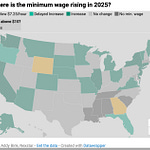This post goes out to both free and paid subscribers, but if you are not already a paid subscriber and value this effort and our growing community, please consider upgrading to a paid membership. Thanks in advance for your financial support of my work — it’s what allows me to keep researching and writing!
The data on the color-coded map below is taken from the USDA which runs the EBT (food stamp) program, including the special, Summer EBT program implemented this year for the first time. The funds for this new program that help feed children in poverty during the summer months comes from The Consolidated Appropriations Act of 2023, signed by President Biden in late 2022, separately from the omnibus budget bill.
“Almost 70 percent of House Republicans represent districts where the median income is lower than the national median, according to researchers at the University of Southern California. By contrast, about 60 percent of House Democrats represent districts more affluent than the median…” The New York Times, March 27, 2023
This is not a new issue—people have voted against their own self-interest for years. But according to recent articles in The Atlantic1 and The New York Times, it is now the “red’ or Republican states whose residents need poverty programs the most, but whose elected officials want to cut or eliminate anything to do with government funded welfare or “handouts” — even if the money comes from the federal government and not their states.
As The Atlantic’s Ronald Brownstein recently wrote, “The escalating confrontation between the parties over the federal budget rests on a fundamental paradox: The Republican majority in the House of Representatives is now more likely than Democrats to represent districts filled with older and lower-income voters who rely on the social programs that the G.O.P. wants to cut.”
Yes, certain states, all headed by Republicans, reliably turn down federal money that would help their own citizens, and nearly all states led by Democrats accept federal monies. But it is also true that not all Republican-led states turn down federal money. Ohio is one example—it immediately accepted federal money for the expansion of Medicaid through the Affordable Care Act, under the direction of then Republican Governor John Kasich, and currently administers the summer EBT program under Republican Governor Mike DeWine (Ohio did cut short the extra pandemic unemployment benefits along with most other Republican-led states).
It seems, then, it’s more than just the usual dichotomy: Republicans dislike federal programs and want to cut government spending (particularly “handouts” to the poor), versus Democrats who tend to favor federal government programs, including supporting federally funded programs targeting poverty. But words might be more telling than raw numbers. Take a look at a few reasons given by Republican state officials for declining this latest grant of summer food stamp money for children:
Oklahoma Gov. Kevin Stitt turned down $48 million [allocated to his state from the Summer EBT program]. Though Oklahoma is one of the most food-insecure states, with surveys finding that more than 200,000 children are hungry at some point during a year, Stitt suggested the administration was “trying to push certain agenda items on kids.”
Mississippi Gov. Tate Reeves called the new program an attempt “to expand the welfare state.”
“Current resource constraints at the state agencies, the level of effort needed to implement a new program and the need for new appropriations from the Legislature [make it] not feasible for Texas to successfully launch Summer EBT in 2024,” said Tiffany Young, a spokesperson for the Texas Department of Health and Human Services. The picture may change in the future, she said.
“That's just another form of welfare,” said Nebraska GOP Gov. Jim Pillen. “I simply disagree, and it's not doing our kids any good.” [Update for Nebraska: Governor Pillen has since changed his mind and has now accepted the money for the program].
Wyoming Superintendent of Public Instruction Megan Degenfelder said she turned down the Summer EBT card funds because she wanted to prioritize the current summer meals programs, which require minimal state funding. “I generally prefer those meals getting directly to kids,” she told The Associated Press. “At the feeding sites, we know that’s happening.”
The last reason for turning down summer food stamps for kids by the Wyoming spokesperson is particularly insulting and fits with the typical conservative thinking on helping the poor (or not) with government programs. Poor people are trying to scam the government at every opportunity and can’t be trusted with money, despite the fact this money is loaded onto a card and you can only use it for groceries. And despite the fact that in this case, the money is only $40 a month extra for each eligible child, and tops out at $120 per child for the summer EBT program.
When I wrote about the basic income project in Denver, Colorado, the issue of trusting the poor to handle a few bucks and allocate it according to their individual needs was shown to be an important part of a poverty program’s success — in this case it was a pilot program providing a small basic income to poor residents: “According to the founder and executive director of the Denver Basic Income Project, Mark Donovan, ‘What is fundamentally different about our approach is the way that we start from a place of trust.’ ”
It’s that season. Our thoughts about the upcoming presidential election must coalesce in a matter of months. But our thoughts must be followed by action, and we have to decide whether to continue with the successful transformation of our economy, from one focused on the ultra-wealthy, to where our country is focused now: on growing the middle-class, expanding the economy from the middle out and helping the poor live in security and dignity. We can’t just shrug and wait to see what “happens” with the election, we have to make the outcome we want happen. On this narrow issue, we can drive change at the local level by lobbying our local elected officials, including the governor’s office, to accept and use all federal funds.
_______________________________________________
Should feeding children really be a partisan issue or used to spite the party occupying the White House? Can we trust the poor and working poor with a bit of cash and a food card to help them help themselves? Leave your thoughts in the Comment Section below.
This link to The Atlantic article is behind a paywall: https://www.theatlantic.com/politics/archive/2023/03/working-class-white-voters-gop-house-agenda/673500/. But you can access it with a one month free trial or subscription.













Share this post